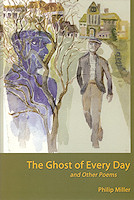nycBigCityLit.com the rivers of it, abridged


Reviews
The Ghost of Every Day and Other Poems
by Philip Miller

The Ghost of Every Day
by Philip Miller
Spartan Press, 2011; 92 pages; $15.00
ISBN 978-0-9816711-6-1, paper
http://www.thesamepress.com/
Reviewed by Melinda Thomsen
At first, when presented with the opportunity to review The Ghost of Every Day, I was thrilled, but when I got down to write, I found it hard to begin. This was Phil Miller's last collection, and because of my addiction to his poems, the thought of reaching the end of my supply was devastating. Luckily, these poems, like all great literature, are so endlessly satisfying that I know I will be cuddling up with these "ghosts" until I leave my own, and I am extremely grateful to Nancy Eldredge, Phil's wife, for making sure I got my final fix.
In this collection of over 60 ghost poems, Miller moves the reader through the world of flesh and spirit in a couple of ways. The first one is chronologically, as the opening poems are set in the winter and are sequenced to finish in the autumn. This progression gives a physical layer of order while the poems simultaneously fluctuate between the physical and spiritual, surfacing through different perspectives. Sometimes the poems reflect the point of view of the ghost, as in "The Ghost of the Great Depression," where the ghost tells us the reason why he haunts the era he does. On the other hand, we see the ghost as the other or outside entity, as in "Late Night Drinking with Father," but Miller's other is the one that we all are, so ghosts are never entirely separate from the living but in fact blend into us.
This relationship cannot be severed and surprisingly is one where the ghosts often depend on us. In "Ghost Children," Miller comes close to the children in Stephen King's The Shining who are endlessly playing, but in this poem the children are not bouncing the ball at the top of the stairs: "They wait for us / to start the ball rolling, / hoping to hear our laughter / and a new song." This poem reaches out to the other to show us how dependent these spirits are on us. Unlike King's, these ghosts aren't ones we should be afraid of.
Miller sets the tone in the first poem's title, "The Flesh Made Word," recalling John 1:14, "the Word became flesh." But this is the opposite to the scripture — as it should be, since the poet is looking at the end of life, of the physical dissipating into the spiritual. He says, "Ah, whisper of the breath / as uphill today I puff a ghost or two / into early frost …" and finishes the poem with "the flesh publishing, / trying hard / to break into words." Throughout the book, there is this push and pull between the physical breaking through into the spiritual realm and the opposite, where the ghost tries breaking into the physical.
In addition, the outside world sometimes reflects the flesh, as in the poem "In the Mirror" just for the way the natural world is taking on our flesh in such vivid language,
humming bees disperse
to sleepy hives
before March's varicose skies
drop fat, wet flakes,
and grass brittles gray,
the color of a zero day,
though it's autumn
we feel in our bones,
grown limber, our faces
unwrinkling as boot-brown
leaves return to trees…"
Here is the play of the author looking in the mirror but seeing in himself all of nature rewinding backwards in his physical appearance. There is such a strong connection between the spirit and the flesh in these lines that the "puffs of ghosts" that the poet released into the world in the opening poem have come back, transformed into the physical again. This poem appears halfway through the book and helps move the reader into the finale of poems that are told through the ghost's eyes.
In "Haunting the Parlor," the ghost contemplates another mirror: "Now that looking glass shimmers / like the surface of a pool so deep / that if you entered it / you might discover secrets / even ghosts can't fathom, / the reasons why spirit / remembers flesh, why I haunt / the same old haunts…" Here the reader understands that these ghosts are thinking spirits who, like us, have questions that will always remain unanswered, and that is why this collection is so rich.
Whenever I watch the ghost hunters on TV or read "true" ghost stories, I am pleased that they explain ghosts as "left-over energy," which is why you see them in narrow stairways or corners of rooms. That is the pat answer I often prefer, but Miller challenges me instead. In his poems, ghosts are not just electrical currents but pieces of us still searching; in their struggles, we discover that they too cannot be categorized as something to be analyzed and measured but actually mirror ourselves, so we see how deeply we are connected to them — in short, how we want to be known.
Melinda Thomsen's poetry and book reviews have been published in journals such as Poetry East, New York Quarterly, Home Planet News, Elysian Fields Quarterly, and The Same. Anthologies include Blues for Bill: A Tribute to William Matthews and Spring from Gatehouse Press Ltd., Great Britain. Finishing Line Press published her chapbook Naming Rights in June 2008 and her new collection from them, Field Rations, was published in December 2011. She received her MFA at Vermont College of Fine Arts in January 2011.